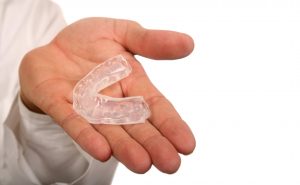 A recent study in the Journal of the American Medical Association looked at 400 college football players and found that 34% had suffered at least one concussion. Unfortunately, the players who had two or more concussions performed more poorly on memory and cognitive tests than those with fewer concussions. The good news is that football injuries have decreased over time with the development of better protective equipment, including sports guards.
A recent study in the Journal of the American Medical Association looked at 400 college football players and found that 34% had suffered at least one concussion. Unfortunately, the players who had two or more concussions performed more poorly on memory and cognitive tests than those with fewer concussions. The good news is that football injuries have decreased over time with the development of better protective equipment, including sports guards.
You heard right. Sports guards protect more than just the teeth – they also protect the head and neck! But is one type of sports guard more effective than another? Yes! Keep reading to find out why seeing a dentist in Feeding Hills for a sports guard is the best way to protect the head and neck from injury.
How Does a Sports Guard Prevent Head and Neck Injuries?
Most people think that the only purpose behind a sports guard is to protect the teeth from being knocked out or injured during athletics. But sports guards also prevent more serious injuries by:
- Stabilizing the head and neck
- Absorbing shock
- Limiting movement
You might think that helmets alone are adequate for injury prevention, but sports guards are an essential addition!
Also, while football and other full-contact activities are obvious choices for wearing sports guards, they’re also recommended for gymnastics, wrestling, track and field, soccer, basketball and baseball, to name a few.
Which Sports Guards Are Best?
When it comes to choosing a sports guard, you have two main options: store-bought and custom-made. Researchers have found in a recent study that custom-made guards are significantly more effective because they meet the following requirements:
- Better fit – A tight but comfortable fit is very important. A sports guard can’t work as well as it’s designed to if it’s too large or too loose!
- Thickness – Store-bought sports guards were found to have an average thickness of 1.65 mm, while custom-made varieties were more than double that at 3.5 mm.
- Comfort – Athletes tend to chew on a sports guard if it isn’t comfortable. This causes it to shift position and also reduces the overall thickness.
- Longevity – In addition, custom-made versions last significantly longer than store-bought types, reducing the likelihood that an athlete will have to go without one before getting a replacement.
If you’d like a custom-made sports guard for either your child or yourself, the first step is seeing a dentist in Feeding Hills. Sports guards can be made in just two appointments! Impressions are taken at the first visit, then you return 1-2 weeks later to pick up your new sports guard and get instructions for maintaining it.
Being active in sports and other activities is a great way to stay in shape and have fun. With the right sports guard, it’s also a lot safer!
About the Author
Dr. Frank Michitti is a general, restorative and cosmetic dentist who knows that prevention is preferable to treatment – particularly when it comes to head and neck injuries. He creates comfortable, high-quality sports guards to help his patients enjoy the activities they love without being injured. If you have any questions, he can be contacted via his website or at (413) 786-4400.

